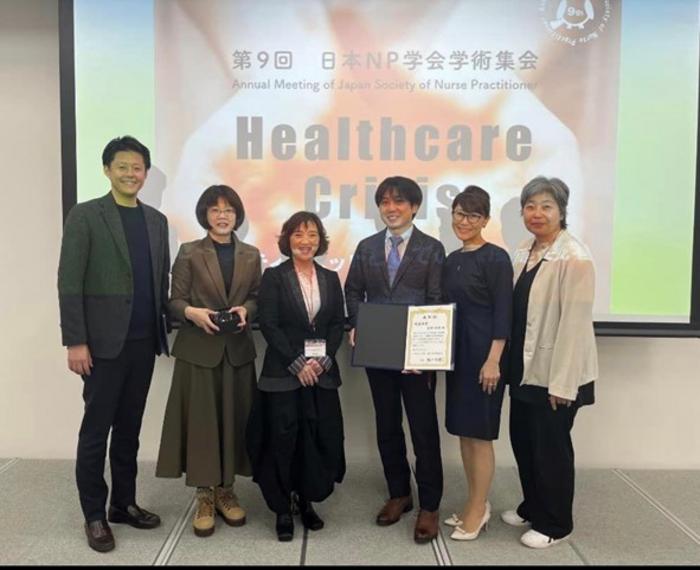The global demographic shift, marked by a decline in birth rates and an increase in aging populations, has posed a significant strain on healthcare resources. Recognizing this need for better healthcare resources, researchers have tried to propose innovative measures, such as the integration of nurses into roles traditionally held by physicians. Nurse practitioners (NPs) have emerged as a potential solution to optimize the allocation of limited medical resources, particularly in addressing primary care physician shortages.

Credit: Prof Nahoko Harada
The global demographic shift, marked by a decline in birth rates and an increase in aging populations, has posed a significant strain on healthcare resources. Recognizing this need for better healthcare resources, researchers have tried to propose innovative measures, such as the integration of nurses into roles traditionally held by physicians. Nurse practitioners (NPs) have emerged as a potential solution to optimize the allocation of limited medical resources, particularly in addressing primary care physician shortages.
In Japan, the development of the NP programs began in 2008, leading to the certification of 759 NPs as of 2023. Despite this progress, the utilization of NPs in specialized settings, such as nursing homes for older adults, remains underexplored. Previous research has mostly focused on NP skills, but there is a notable lack of studies exploring the actual effects of NP-led care in primary settings. Against this backdrop, Dr Nahoko Harada from Okayama University, worked with a team of researchers, consisting of Dr. Masahide Koda from the Co-learning Community Healthcare Re-innovation Office, Graduate School of Medicine, Dentistry and Pharmaceutical Sciences, Okayama University and Professor Miho Suzuki from the Faculty of Nursing and Medical Care, Keio University, published a study in The Journal for Nurse Practitioners on December 04, 2023. This study aimed to identify the role of NPs in specialized nursing homes for older adults in Miyagi Prefecture, Japan.
“In the US, nurse practitioners (NPs) have expanded their role to provide quality healthcare, especially in regions facing physician shortages. As a researcher educated in NPs in the US, I wanted to find evidence regarding the clinical impact of NPs in Japan and their contribution to the health of the population,” says Dr Harada.
The researchers conducted a retrospective investigation in a nursing home in Miyagi Prefecture, Japan, by comparing two distinct periods: one before the introduction of NPs, which spanned from October 2019 to September 2020 (cohort group), and the other after their introduction, from October 2021 to September 2022 (non-cohort group), in the nursing home. The research method involved a multilevel logistic regression analysis examining variables including residents’ age, care needs, the Charlson comorbidity index (CCI), emergency department (ED) visits, hospitalizations, and overall medical expenses.
Assessing the 229 residents in a Miyagi nursing home, researchers observed that in higher care needed residents, emergency visits decreased after NPs’ introduction. Elders demanding advanced care increased (78% to 76.6%), but visits to ED dropped (from 0.8 to 0.5 times). For non-cohort residents, though care needs remained steady, ED visits significantly decreased (from 1.1 to 0.5 times). Multilevel logistic regression analysis showed that despite increased higher care needs, reduced emergency visits post-NP placement was significantly reduced, signaling the impactful role of NPs in optimizing care delivery.
Dr Harada further emphasizes, “The observed reduction in unnecessary hospital visits tied with NPs’ intervention in managing non-hospitalization requiring conditions, underscores their pivotal role in early diagnosis and continuous patient monitoring.”
Amid Japan’s aging population and limited medical resources, this research underscores the urgent need to acknowledge and amplify NP contributions. It signals an essential call for policymakers, researchers, and healthcare stakeholders to leverage NPs’ potential, addressing resource disparities and enhancing elderly care.
These findings highlight a paradigm shift in elder care, suggesting NPs as pivotal players in optimizing healthcare delivery, reducing unnecessary hospital visits, and advocating for a reassessment of their roles within the broader healthcare framework.
Additionally, the study’s implications can be extended globally, particularly to countries experiencing similar aging challenges like South Korea, Singapore, China, and Thailand. The research highlights the relevance and adaptability of NP-driven care models, offering insights crucial for refining healthcare systems worldwide. “In the midst of the demand to reform the way medical personnel work, we were able to provide evidence regarding the maintenance of the quality of medical care by medical practice nurses. This knowledge can be applied to future health care economic benefits from optimizing medical human resources“, concludes a hopeful Dr Harada.
About Okayama University, Japan
As one of the leading universities in Japan, Okayama University aims to create and establish a new paradigm for the sustainable development of the world. Okayama University offers a wide range of academic fields, which become the basis of the integrated graduate schools. This not only allows us to conduct the most advanced and up-to-date research, but also provides an enriching educational experience.
Website: https://www.okayama-u.ac.jp/index_e.html
About Professor Nahoko Harada from Okayama University, Japan
Dr. Nahoko Harada is a dedicated academic professional with experience in disaster nursing, mental health, humanitarian work, and primary care. With affiliations at various esteemed institutions like Boston College, University of Kochi, and The University of Tokyo, her impactful contributions are reflected in 882 citations and an h-index of 14 on Google Scholar since 2018. Her research spans disaster nursing, mental health, and humanitarian aid showing her commitment and valuable insights in these critical fields.
Journal
The Journal for Nurse Practitioners
DOI
10.1016/j.nurpra.2023.104845
Method of Research
Observational study
Subject of Research
People
Article Title
Nurse Practitioner Placement in A Nursing Home in Japan
Article Publication Date
4-Dec-2023
COI Statement
The authors report no conflicts of interest




